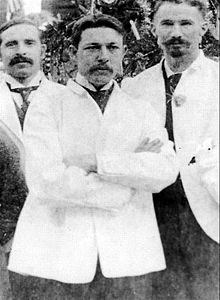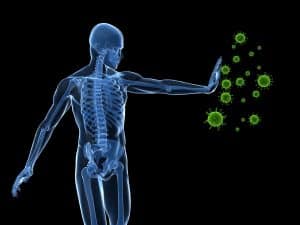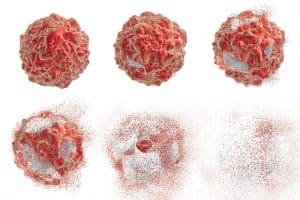Immunotherapy cancer treatments like Coley’s CPG and checkpoint inhibitor drugs are currently being marketed in the United States as the “newest” ways to treat cancer. Some are available to patients now, and several are still undergoing trials with the Food and Drug Administration (FDA). But the truth is, these treatments aren’t new at all. They’re only new to the U.S.
These “breakthrough treatments” have actually been around for many years, and while the U.S. has been testing them extensively using mouse models, an integrative hospital in Mexico has been using them to treat human patients.
CHIPSA Hospital, located in Tijuana, has been offering patients immunotherapy treatments for nearly 40 years. Several of their cutting-edge treatments have now been approved by the FDA and hailed as some of the best “discoveries” of the 21st century. CPG is one of those treatments.
 The hospital’s medical director Anton Escobedo said that he was pleased to hear about the recent mouse study boasting the success of immunotherapy vaccines, a treatment that is similar to CHIPSA’s CPG. “When the study came out,” he said, “I was pleased to see they were using CPG. We have a lot of experience with a form of CPG so we weren’t surprised to see it work well in combination with checkpoint inhibitors. We love when science proves what we’re doing is right. 10 years ago, they wouldn’t even acknowledge it.”
The hospital’s medical director Anton Escobedo said that he was pleased to hear about the recent mouse study boasting the success of immunotherapy vaccines, a treatment that is similar to CHIPSA’s CPG. “When the study came out,” he said, “I was pleased to see they were using CPG. We have a lot of experience with a form of CPG so we weren’t surprised to see it work well in combination with checkpoint inhibitors. We love when science proves what we’re doing is right. 10 years ago, they wouldn’t even acknowledge it.”
So what is CPG?
 CPG is one of the main drivers of a treatment protocol called Coley’s toxins. Coley’s toxins was discovered in 1891 by Dr. William Coley, a surgeon at what is now known as Sloan Kettering Hospital. In one of his studies, Coley discovered that the only surviving patient of a sarcoma had contracted a bacterial infection that was so advanced he almost died. But after overcoming the infection, the patient’s cancer was completely gone. It soon became clear to Coley that infection stimulated the immune system so much that it also began to eradicate disease.
CPG is one of the main drivers of a treatment protocol called Coley’s toxins. Coley’s toxins was discovered in 1891 by Dr. William Coley, a surgeon at what is now known as Sloan Kettering Hospital. In one of his studies, Coley discovered that the only surviving patient of a sarcoma had contracted a bacterial infection that was so advanced he almost died. But after overcoming the infection, the patient’s cancer was completely gone. It soon became clear to Coley that infection stimulated the immune system so much that it also began to eradicate disease.
Coley then developed live bacteria “vaccines” to give to cancer patients in the hopes that their bodies would also fight off the cancer. He had several patients go into remission after the live vaccine, and even more when he changed the bacteria to dead to reduce the number of patients dying from infection. From 1891-1936, Dr. Coley had a higher success rate treating most cancers than we do today. Now, over 100 years later, he is considered the father of immunotherapy.
 CHIPSA has been using Coley’s toxins in combination with other immuno-stimulating and detoxification protocols since 1996. For the last two years of his life, the famed Dr. Josef Issels came from Germany and trained the doctors at CHIPSA to treat patients with a combination of Coley’s toxins and his famous autologous cell vaccine. They have since combined these protocols with Gerson therapy, Hyperbaric Oxygen therapy, Insulin Potentiation therapy (IPT) and Dendritic Cell Vaccine to have the most complete integrative protocol to treat cancer and other degenerative diseases.
CHIPSA has been using Coley’s toxins in combination with other immuno-stimulating and detoxification protocols since 1996. For the last two years of his life, the famed Dr. Josef Issels came from Germany and trained the doctors at CHIPSA to treat patients with a combination of Coley’s toxins and his famous autologous cell vaccine. They have since combined these protocols with Gerson therapy, Hyperbaric Oxygen therapy, Insulin Potentiation therapy (IPT) and Dendritic Cell Vaccine to have the most complete integrative protocol to treat cancer and other degenerative diseases.
Scientists discovered CPG in the 1990s and found it to be a strong stimulator of the immune system. Early FDA trials of CPG showed some impressive patient responses, but in the end, the trial failed. Now, 10 years later, there are multiple trials testing CPG and checkpoint inhibitor immunotherapy. Researchers now believe that CPG could offer a way for more patients to have success with checkpoint inhibitor drugs.
There are multiple TLR pathways that Coley’s fluid activates, and many of them aren’t well understood, but one that has been heavily studied is CPG.
“In many ways, we have been on the sidelines cheering the scientists on,” said Escobedo. “It’s a treatment we understand well. But the problem with trials is that they don’t leave much room for a doctor to be a doctor. They are rigorous scientific studies, and rigorous scientific studies aren’t doing what’s best for every individual patient. That’s one of the ways we’re much different at CHIPSA.”
 CHIPSA has been successful treating patients with Coley’s toxins in combination with checkpoint inhibitors like Opdivo and Keytruda. Their new formulation, Coley’s CPG, shows great promise in creating even more effective responses from CHIPSA patients using a combination approach.
CHIPSA has been successful treating patients with Coley’s toxins in combination with checkpoint inhibitors like Opdivo and Keytruda. Their new formulation, Coley’s CPG, shows great promise in creating even more effective responses from CHIPSA patients using a combination approach.
CHIPSA’s integrative nature means that they don’t just use “alternative” treatments. They combine what some people may call “alternative” methods with conventional or more mainstream techniques, which allows them to use the “best of both worlds.” One integrative method that they use frequently is low-dose chemotherapy combined with immunotherapy.
Low-Dose Chemotherapy
Although for many years, most medical practitioners have dismissed low-dose chemotherapy as useless, CHIPSA believed in its potential. Rather than discounting it as “wasteful,” CHIPSA decided to explore its power.
Their research team believed there was a chance that the chemotherapy actually worked to show the immune system that cancer was present in the body. So if were to be used with other treatments like Coley’s CPG, checkpoint inhibitors, and Apatone, the immune system would both see the cancer and have the power to fight it. Using the chemotherapy at a low dose would allow for less of a toxic treatment and more for natural immunity.
“Our approach is common sense,” said Escobedo. “We are looking to combine the best in cutting-edge therapy with the things we know have worked for years. This is truly an exciting time for us at CHIPSA because we have many people completing trials with the different treatments that we offer. We are able to use the data to make adjustments. And nobody understands the combinations the way we do. I suspect it will take the U.S. another 10 years to catch up.”
The common sense approach seems to be working, as many patients have had great success in treating their cancer at CHIPSA. Their focus on nutrition, gut health, mental and emotional health, combined with their innovative checkpoint inhibitor drugs, Coley’s CPG, and targeted low-dose chemotherapy, could finally be the key to fighting cancer once and for all.
Editors Note: To learn more about CHIPSA Hospital and the treatments they offer, please click here: www.chipsahospital.org


























